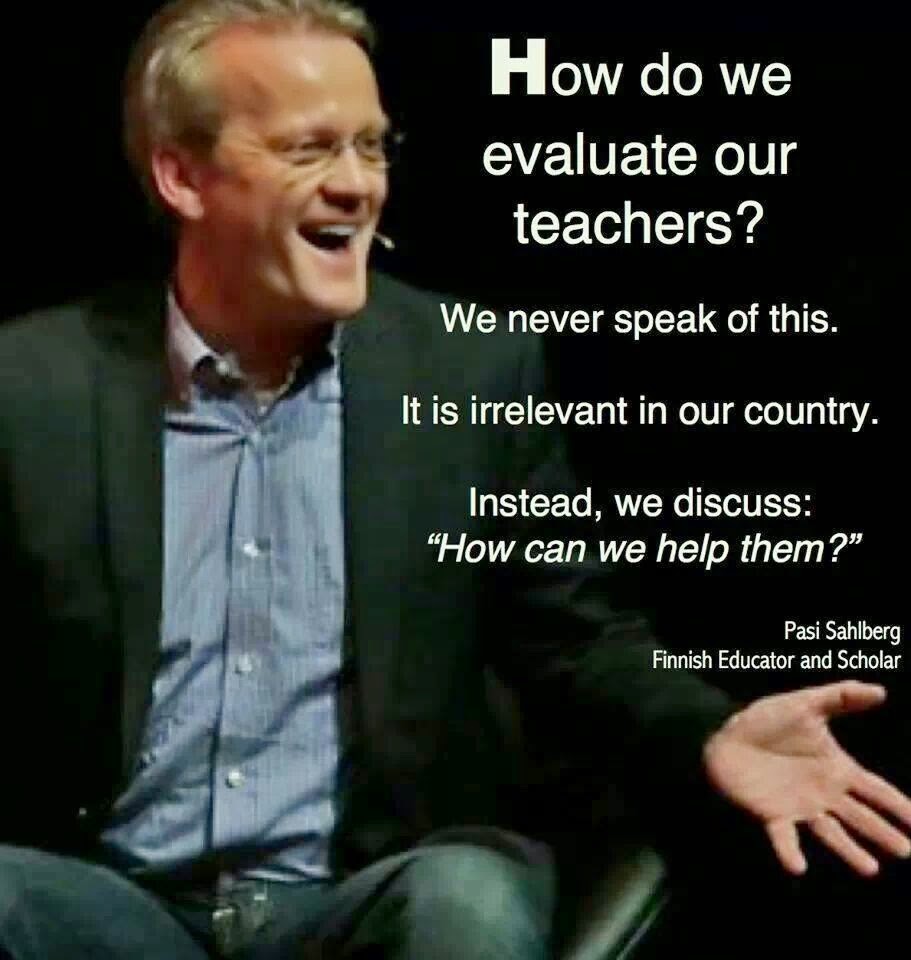By Allan Alach
I welcome suggested articles, so if you come
across a gem, email it to me at allan.alach@ihug.co.nz
This week’s homework!
Am I the only person thinking this about the teaching profession?
 |
| Why do we follow the US not Finland? |
“I've
been wondering.... wondering if we're becoming so obsessed with
professionalising teaching we're losing sight of the individual teacher. This
may be controversial. But I think if someone is not willing
to stop and challenge this road we seem to be travelling, we may go too far
down the road of no return.”
Why the Best Teachers Don't Give Tests
Alfie Kohn - say no more…
“When
teachers test their students, the details of those tests will differ from one
classroom to the next, which means these assessments by definition are not
standardized and can't be used to compare students across schools or states.
But they're still tests, and as a result they're still limited and limiting.”
The Myth of Chinese Super Schools
The battle for education is truly international.
I was sent this link by Antonio
Dias de Figueiredo, from Portugal.
“The
United States is already ensnared in the testing obsession that has trapped
China. It is not too late to escape. Parents and educators across the nation
are up in arms about the amount of instructional time now devoted to test
preparation and testing. Yong Zhao offers wise counsel. We should break our
addiction to standardized testing before we sacrifice the cultural values that
have made our nation a home to innovation, creativity, originality, and
invention.”
The cerebral life of schools
“The
revolution of the ‘rational’ could give birth to an equal or greater absurdity than the ‘irrationality’ it usurps. Let us make sure that the best of what already exists in
our system, our schools, our classrooms and our minds always forms the basis of
what is to come.”
My alternative school – proof
you don’t need grades and the curriculum
 |
| Josh Chapman |
The Value of Connecting the Dots to Create “Real
Learning”
 |
| Testing and grading not learning. |
Neophobia (fear of the new) - not new but it's damn annoying
 “Neophobia,
fear of the new, is not new. No doubt some wag in some cave was asking their
kids to ‘put those axes away, they’ll be the death of you’. From Socrates, who
thought that writing was an ill-advised invention, people have reacted with
predictable horror to every piece of new technology that hits the street. It
happened with writing, parchments, books, printing, newspapers, coffee houses,
letters, telegraph, telephone, radio, film, TV, railways, cars, jazz, rock n’ roll, rap, computers and now the internet and especially social
media. The idea that some new invention rots the mind, devalues the culture,
even destroys civilisation is an age-old phenomenon.”
“Neophobia,
fear of the new, is not new. No doubt some wag in some cave was asking their
kids to ‘put those axes away, they’ll be the death of you’. From Socrates, who
thought that writing was an ill-advised invention, people have reacted with
predictable horror to every piece of new technology that hits the street. It
happened with writing, parchments, books, printing, newspapers, coffee houses,
letters, telegraph, telephone, radio, film, TV, railways, cars, jazz, rock n’ roll, rap, computers and now the internet and especially social
media. The idea that some new invention rots the mind, devalues the culture,
even destroys civilisation is an age-old phenomenon.”
“First,
the countries that have been pursuing this strategy tend to be the countries
that have experienced the greatest declines in student performance over the past
decade. Australia, New Zealand, UK, USA, and Sweden have all seen their school
results decline despite the introduction of market-based policies.”
This week’s contributions from
 |
| Bubble science |
Bruce's comment: Some excellent science
activities to excite your class.
Fixed vs. Growth: The Two Basic Mindsets
That Shape Our Lives
“The consequences of believing that intelligence and personality can
be developed rather than being immutably engrained traits, Dweck found in her
two decades of research with both children and adults, are remarkable.”
Teachers told: spend less time marking
books to cut excessive workload
Bruce’s comment:
Sounds like common sense.
“Ask any teacher and they’ll give you at least two more examples like that: whether it’s having to highlight their lesson plans in five different colours
or inputting every pupil’s marks into countless
different spreadsheets in countless different ways at regular points in the
year.”
Why Daydreaming is Critical to Effective
Learning
Bruce’s comment: Is
multi tasking a myth –
and how to achieve quality work.
“Many people believe they are skilled multitaskers, but they’re wrong. Neuroscience has shown that multitasking — the
process of doing more than one thing at the same time — doesn’t exist.”
From Bruce’s ‘oldies but goodies’ file:
Bruce’s
comment: The right for all students to learn – but to do so schools have to change first.
“As
we enter the second decade of the 'new' millennium what has changed in
education? Not much.We can do a lot better. What is needed are fresh
perspectives.So far reforms have not changed the basic assumptions of
traditional schooling. A new vision is required.”
Dysfunctional Schools
Bruce’s
comment: How school practices (like streaming/ability grouping) harm schools.
“I
don't think teachers like to face up to the fact that schooling actually harms
many of their students but it is clear , reading Kirsten's Olsen book, it does.
Obviously this harming is not done intentionally but it is all too easy to
blame failure on dysfunctional students. Certainly too few students leave
school with their joy of learning alive and their unique gifts and talents
strengthened - not even the so called successful students.”


.jpg)

.jpg)



No comments:
Post a Comment